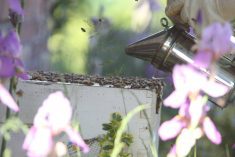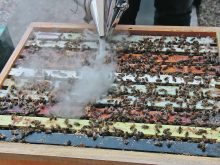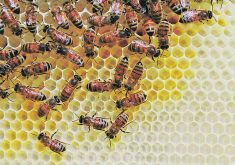The David Suzuki Foundation says urban beekeeping is bad for bees.
The environmental group is urging hobby beekeepers to get rid of their hives, if they’re in cities, because honeybees can be harmful to wild bees.
Research from Concordia University in Montreal suggests that honeybees “outcompete” other pollinators and are detrimental to wild bee populations.
“We’re not saying that beekeeping is inherently bad,” said Jode Roberts, manager of a rewilding program with the foundation and a beekeeper in Toronto.
“It can be a great way to support local food production and raise awareness. However, we need to be mindful of the potential negative impacts on our wild bee populations and take steps to mitigate them.”
Read Also

Government, industry seek canola tariff resolution
Governments and industry continue to discuss how best to deal with Chinese tariffs on Canadian agricultural products, particularly canola.
The Concordia University study was conducted in Montreal and published this winter.
The number of beehives in Montreal exploded in the city from 2013 to 2020, going from 250 colonies to almost 3,000. There was a similar trend in other Canadian cities as thousands of urbanites became hobby beekeepers in the last 10-15 years.
The researchers studied wild bee populations in Montreal and found a direct link between a high concentration of honeybee hives and a low population of wild bees.
The negative impact boils down to numbers.
A healthy honeybee colony can contain thousands of bees. Those bees will consume the available pollen and nectar, making life difficult for wild bees.
“Urban beekeeping is commonly perceived as an environmentally friendly practice or a way to combat pollinator declines,” they wrote in the paper’s abstract. “(But) high-density beekeeping operations may actually have a negative influence on native and wild bee populations through floral resource competition and pathogen transmission.”
Honeybees can pass viruses and diseases to wild bees, the scientists said.
If people in Toronto, Montreal and Vancouver want to help bees, a better approach is planting pollinator gardens or leaving a bare patch of soil so wild bees can nest underground.
“Just as we wouldn’t advocate keeping backyard chickens to save the birds, we shouldn’t look to beekeeping to save the bees,” said Carly Ziter, assistant professor of biology at Concordia. “It’s important that our intentions line up with our impact.”


















